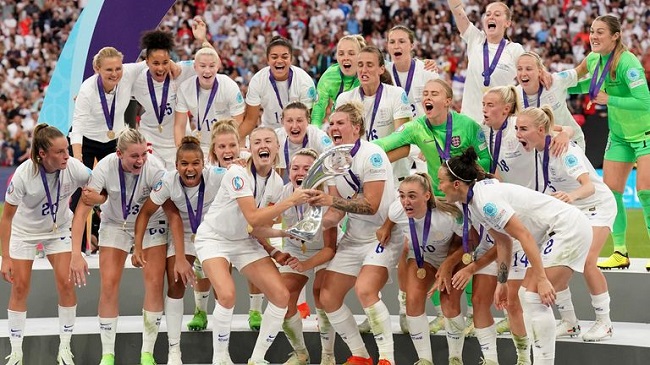After Kelly’s goal against Germany in overtime, England was declared the champions of Euro 2022.
Has England Ever Won the Euros
Ecstasy. A first international goal from Chloe Kelly helped England overcome the eight-time winners Germany and win the trophy, England’s first major trophy since 1966 and the first for the Lionesses.

Even though Ella Toone’s incredible second-half chip over Merle Frohms looked to have been enough, Lina Magull’s 79th-minute score forced overtime.
Kelly pounced as penalties loomed, turned in a goal from close range, and stole the show after overcoming an anterior cruciate ligament injury that had previously derailed her Olympic hopes and threatened her European ambitions.
Kelly, as a nod to the revolution that the Lionesses had launched in England, whipped her shirt off in excitement, mimicking the iconic image of USA forward Brandi Chastain from the 1999 Women’s World Cup final, which helped the game explode in the US.
The 87,192 in attendance broke both the record for a European Championship final established in 1964 by the men’s final, and the record for a women’s international in England, set by the 80,203 who watched the 2012 Olympic gold-medal match.
More than six previous attendance records for the Women’s European Championship have already fallen as this competition progressed.
Tube trains in northwest London were packed with people wearing England shirts as early as midday, demonstrating the tournament’s impact on the public.
The Wembley Way area was packed with spectators even before the game started. In the midst of the carnival-like atmosphere, the relatives of some of the players who had slipped out of the stadium to take it all in could be overheard whispering about their nervousness and how excited they were to see the women’s game go.
The Finest two teams in Euro 2022 met in the Championship game, and the result was a Historic tie.
England had the opportunity to show that they had caught up to the European powerhouse in the 13 years after their 6-2 final loss to Germany.
Alex Popp, who was level for the golden boot with Beth Mead on five goals going into the final with the latter earning the award with more assists, was a late scratch from Germany’s starting XI after picking up an injury in the warmup, giving Sarina Wiegman’s team a great head start.
Popp, who has more than 100 caps but has never played in a European Championship because of injuries, was knocked out of the tournament in painful fashion.
Both coaches had promised a close game, and if the pressure of the moment had been getting to the Lionesses, they were quickly put at ease. While Lauren Hemp did break free on the left and find Ellen White lurking at the far post, Frohms made quick work of her header.
With Georgia Stanway and Lena Oberdorf, two of the competition’s most formidable midfielders, fighting head to head, it was only a matter of time before a card was shown. This time it was Stanway, but after the intermission Oberdorf took care of her own booking.
In the 25th minute, Germany nearly took the lead when Mary Earps fumbled a corner that bounced around before she finally fell on it, relieved. The delay caused by the video assistant referee checking for a handball was brief.
Halftime whistle was quite welcome as the game had become a little niggly due to the questionable decisions made by the Ukrainian referee, Kateryna Monzul.
With Germany scoring six first-half goals in five games en route to the final, England’s 0-0 halftime score might not be the worst scenario.
The Lionesses have struggled early in each of their elimination matches before finding their stride. Although Wiegman’s squad rallied from a goal down to beat Spain in the quarterfinals, a more clinical start to the semi-final would have been devastating.
Germany were desperate to rejigger in order to eliminate the threat posed by Lucy Bronze and to better defend Felicitas Rauch, so they substituted forward Jule Brand for Tabea Wassmuth at halftime. After the change, the green team resumed their earlier success.
The switch from Fran Kirby and White to Toone and Alessia Russo has become Routine.
The swaps reignited the Lionesses, and England took the lead after only six minutes, setting up frenzied celebrations.
Keira Walsh’s line-splitting long pass set up Manchester United attacker Craig Toone, who chipped the ball over keeper Emily Frohms.
In an effort to get a second, England dipped lower and lower as time passed.
Magull posed a continual danger, blasting an upward shot off the crossbar and then having Lea Schüller direct the rebound right at Earps.
But with 11 minutes left in regulation time, the persistent serial winners tied the score. Magull scored on a close-range header after some nice combination play with substitutes Sydney Lohmann and Wassmuth.
England’s triumph over Spain in the quarterfinals was tense, but the start of extra time made for a calm evening stroll. With the help of hastily communicated orders in the huddles, Germany quickly gained the upper hand.
It seemed like Wiegman had shown her hand before it was time.
Yes, Russo and Toone had supplied the impetus for the opening goal, but with Kelly also on, suddenly the bench seemed a lot lighter, and Germany called on the fresh legs of the midfielder Linda Dallmann and the defender Sara Doorsoun as extra time drew on.
With only 10 minutes left on the clock, England’s Kelly scored her maiden goal for her country when a Hemp corner was swung in, the ball rebounded down off Bronze, and Kelly turned it in.
Following the score, England attempted to put on a display for the partisan crowd and clinch the victory. It was courageous, draining, and exhilarating; there were tears shed; and England won.